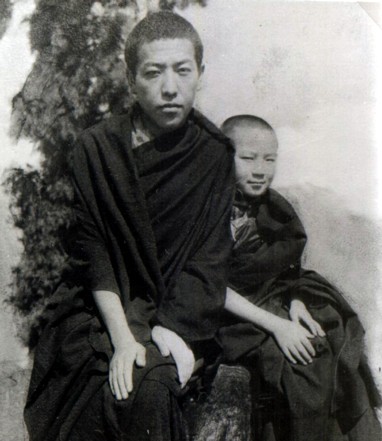Thartse Khen Rinpoche: Difference between revisions
No edit summary |
No edit summary |
||
| Line 1: | Line 1: | ||
[[Image:Thartse Khen and Sogyal Rinpoche.JPG|frame|'''Ngor Thartse Khen Rinpoche and Sogyal Rinpoche''']] | [[Image:Thartse Khen and Sogyal Rinpoche.JPG|frame|'''Ngor Thartse Khen Rinpoche and Sogyal Rinpoche''']] | ||
'''Ngor Thartse Khenpo | '''Ngor Thartse Khenpo Sonam Gyatso Rinpoche''' aka Hiroshi Sonami (1930-1988) - A disciple of [[Jamyang Khyentse Chökyi Lodrö]]. Khen Rinpoche was born into a noble family in Lhasa in 1935, the son of Tsipon Shuguba, Treasurer in the central government of Tibet. His younger brother, Lama Kunga Rinpoche, who is the director of Ewam Choden (Sakyapa) Tibetan Buddhist Center in Berkeley, California. was born in 1935 and recognized as the tulku of Sevan Repa, one of the heart-sons of [[Milarepa]]. After his escape from Tibet, Khen Rinpoche became head of the Tibetan section of the National Library of Japan (hence the alternate name of Hiroshi Sonami, a Japanese rendering of Sonam Gyatso). He subsequently relocated to Berkeley, California where he lived until he departed this realm due to stomach cancer. A deeply humble and compassionate man, he lived quietly, engaged in his studies and meditation. Khen Rinpoche claimed that the authorities were mistaken when they authoritatively recognized and enthroned him as one of the highest ranking tulkus in the Sakya School. However, his protestations were seen by his devoted friends and followers as yet one more example of his profound realization. ([[Dhongthog Rinpoche]]'s Autobiography gives his dates as 1933-1987.) | ||
==Publications== | ==Publications== | ||
Revision as of 01:49, 22 December 2008

Ngor Thartse Khenpo Sonam Gyatso Rinpoche aka Hiroshi Sonami (1930-1988) - A disciple of Jamyang Khyentse Chökyi Lodrö. Khen Rinpoche was born into a noble family in Lhasa in 1935, the son of Tsipon Shuguba, Treasurer in the central government of Tibet. His younger brother, Lama Kunga Rinpoche, who is the director of Ewam Choden (Sakyapa) Tibetan Buddhist Center in Berkeley, California. was born in 1935 and recognized as the tulku of Sevan Repa, one of the heart-sons of Milarepa. After his escape from Tibet, Khen Rinpoche became head of the Tibetan section of the National Library of Japan (hence the alternate name of Hiroshi Sonami, a Japanese rendering of Sonam Gyatso). He subsequently relocated to Berkeley, California where he lived until he departed this realm due to stomach cancer. A deeply humble and compassionate man, he lived quietly, engaged in his studies and meditation. Khen Rinpoche claimed that the authorities were mistaken when they authoritatively recognized and enthroned him as one of the highest ranking tulkus in the Sakya School. However, his protestations were seen by his devoted friends and followers as yet one more example of his profound realization. (Dhongthog Rinpoche's Autobiography gives his dates as 1933-1987.)
Publications
- Ngor Thartse Khenpo Sonam Gyatso (bSod nams rgya Mtsho), Tibetan Mandalas: The Ngor Collection, Tokyo, Kodansha, 1983